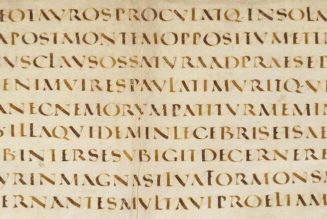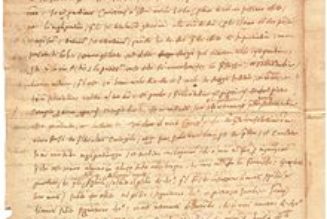 In writing his classic The Secret of the Rosary (ca. 1700), Montfort wanted to elevate the experience of praying this medieval devotion as well as underscore its spiritual power:
In writing his classic The Secret of the Rosary (ca. 1700), Montfort wanted to elevate the experience of praying this medieval devotion as well as underscore its spiritual power:
It is not so much the length of a prayer as the fervor with which it is said which pleases God and touches his heart. A single Hail Mary said properly is worth more than a hundred and fifty said badly.
By “badly” he means rushed or inattentively. While we cannot help involuntary distractions, he warns against willful ones:
How can we expect God to listen to us if we ourselves do not pay attention to what we are saying? How can we expect him to be pleased if, while in the presence of his tremendous majesty, we give in to distractions?
The following is some rich commentary on the Our Father from Montfort’s book:
“Our Father,”
“We should say the Our Father with the certitude that the eternal Father will hear us because it is the prayer of his Son, whom he always hears, and because we are his members. God will surely grant our petitions made through the Lord’s Prayer because it is impossible to imagine that such a good Father could refuse a request couched in the language of so worthy a Son, reinforced by his merits, and made at his behest.”
“Hallowed by thy name.”
We ask here that all the world may learn to know and adore the attributes of our God, who is so great and so holy. We ask that he may be known, loved and adored by pagans, Turks, Jews, barbarians and all infidels; that all men may serve and glorify him by a living faith, a staunch hope, a burning charity, and by the renouncing of all erroneous beliefs.
“Thy kingdom come.”
That is to say: May you reign in our souls by your grace, during life, so that after death we may be found worthy to reign with thee in thy kingdom, in perfect and unending bliss; that we firmly believe in this happiness to come; we hope for it and we expect it, because God the Father has promised it in his great goodness, and because it was purchased for us by the merits of God the Son; and it has been made known to us by the light of the Holy Spirit.
“Thy will be done on earth as it is in heaven.”
[T]his sentence does not mean in the least that we are afraid of people thwarting God’s designs, because nothing whatsoever can happen without divine Providence having foreseen it and having made it fit into his plans beforehand. Rather, when we say these words, we ask God to make us humbly resigned to all that he has seen fit to send us in this life.
“Give us this day our daily bread.”
By asking for our daily bread, we humbly admit our own poverty and insufficiency, and pay tribute to our God, knowing that all temporal goods come from his Providence. When we say bread we ask for that which is necessary to live; and, of course that does not include luxuries. …We ask for this bread today, which means that we are concerned only for the present, leaving the morrow in the hands of Providence.
“Forgive us our trespasses as we forgive those who trespass against us.”
Every sin, says St. Augustine and Tertullian, is a debt which we contract with God, and he in his justice requires payment down to the last farthing. …No matter how many they may be, we should go to God with all confidence and with true sorrow for our sins. While sincerely asking God to forgive us as we forgive those who trespass against us, we no longer give way to anger and revenge, we return good for evil and we love our enemies.
“Lead us not into temptation”
To ask God to save us from falling into sin when we are tempted is to give proof that we are fighting laziness and that we are genuinely seeking means to root out vicious habits and to work out our salvation.
“But deliver us from evil.”
The evil of sin, from the evil of temporal punishment and of everlasting punishment, which we have rightly deserved. To pray God to deliver us from evil is to fear his justice, and this will give us true happiness, for the fear of God is the beginning of wisdom. It is through the virtue of the fear of God that men avoid sin.
If we mean in our hearts what we say with our lips, and if our intentions are not at variance with those expressed in the Lord’s Prayer, then, by reciting this prayer, we hate all sin and we observe all of God’s laws.
…rjt









